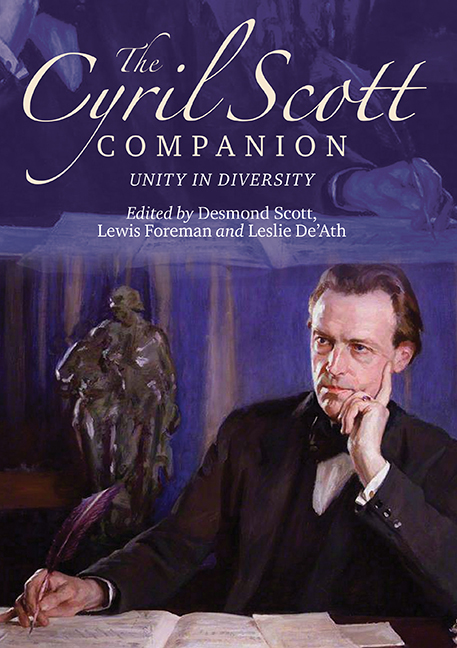Book contents
- Frontmatter
- Dedication
- Contents
- List of Illustrations
- List of Tables
- List of Contributors
- Foreword
- Preface
- Acknowledgements
- Editors' Note
- I SCOTT IN CONTEXT
- II THE MUSIC
- 8 Discovering, Editing and Recording Cyril Scott
- 9 ‘Years of Indiscretion’: The Early Piano Works, 1898–1909
- 10 ‘Like a Bird Sings’: The Piano Works from the Op. 66 Sonata to World War 1
- 11 The Later Piano Works
- 12 The Twenty-First-Century Orchestral Recordings: The Shock of the Unknown
- 13 The Chamber Music
- 14 Operas and Music for the Theatre
- 15 The Choral Works
- 16 The Songs
- III THE WRITINGS
- IV PERSONAL REMINISCENCES
- APPENDICES
- CATALOGUES, DISCOGRAPHY AND BIBLIOGRAPHY
- Index of Works
- General Index
16 - The Songs
from II - THE MUSIC
Published online by Cambridge University Press: 14 September 2019
- Frontmatter
- Dedication
- Contents
- List of Illustrations
- List of Tables
- List of Contributors
- Foreword
- Preface
- Acknowledgements
- Editors' Note
- I SCOTT IN CONTEXT
- II THE MUSIC
- 8 Discovering, Editing and Recording Cyril Scott
- 9 ‘Years of Indiscretion’: The Early Piano Works, 1898–1909
- 10 ‘Like a Bird Sings’: The Piano Works from the Op. 66 Sonata to World War 1
- 11 The Later Piano Works
- 12 The Twenty-First-Century Orchestral Recordings: The Shock of the Unknown
- 13 The Chamber Music
- 14 Operas and Music for the Theatre
- 15 The Choral Works
- 16 The Songs
- III THE WRITINGS
- IV PERSONAL REMINISCENCES
- APPENDICES
- CATALOGUES, DISCOGRAPHY AND BIBLIOGRAPHY
- Index of Works
- General Index
Summary
THESE are not parlour songs, easy on the ear, easy to absorb, passing through voice or fingers and making little impression en route. The best create an individual sound-world, but some singers will find them hard to grasp; their angularity and chromaticism mean that they are demanding to sing, and they require singers willing to put their technique and artistry fully at Scott's disposal, to enable the musical painting to come alive. The songs do not set the precise meaning of the words: they are not settings of the poems as such, but rather, settings of the sense behind the poems, of the images that these evoke. This is why Scott's settings of Dowson and Watson, especially, are so effective: the words are in themselves almost irrelevant, but Dowson's and Watson's gift of evoking emotions and memories provided the means within which Scott could create a private world.
It is of course not possible in a chapter of this scale to examine all Scott's songs, so I have limited myself to most of the settings of Ernest Dowson, Rosamund Marriott Watson, and Scott himself; the folk-song settings; and those that I consider of particular interest. It is therefore a personal choice. Appendix 1, at the end of this volume, gives details of where I have found occasional misprints (through examination of high- and low-voice versions of the same song); this is a brief and by no means complete list. In giving an overview, I have also endeavoured to give enough information to enable performers to decide which songs to seek out and explore further. A few songs are available only in manuscript; I have only mentioned these where they shed light on Scott's development.
Scott was commissioned to write songs and piano pieces on a regular basis; this provided an income, but their brevity and need for accessibility coloured their composition and their reception. An undated press notice from the Daily Telegraph is illuminating: ‘Mr. Cyril Scott's music is fresh and pleasing, and the writing shows no sign of effort.’ Some of Scott's 150 or so songs are distinctly unremarkable, but the majority are very fine and many are exceptional; that these remain unknown is not justifiable. It does not help that so few are still in print; the rest are to be found in various libraries, in secondhand shops, on internet sites, and through inter-library loan.
- Type
- Chapter
- Information
- The Cyril Scott CompanionUnity in Diversity, pp. 277 - 308Publisher: Boydell & BrewerPrint publication year: 2018



